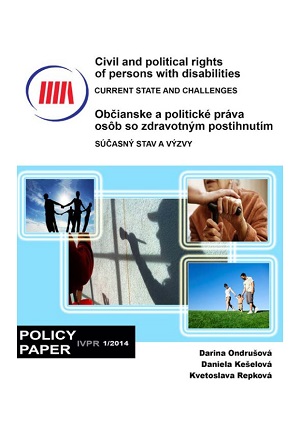Občianske a politické práva osôb so zdravotným postihnutím - súčasný stav a výzvy
Civil and political rights of persons with disabilities - current state and challenges
Author(s): Darina ONDRUŠOVÁ, Kvetoslava Repková, Daniela KešelováSubject(s): Politics / Political Sciences
Published by: Inštitút pre výskum práce a rodiny
Keywords: political rights; civil rights; persons with disabilities; disability; citizenship
Summary/Abstract: In modern democracies, political rights are guaranteed equally to all citizens (under specified circumstances such as age), people with disabilities not excluding. However, do people with disabilities also have equal opportunities to exercise these rights? In Slovakia, these issues are not subject to many reports, researches and even public debates. This statement may be confirmed by results of a flash survey which we conducted in early September 2013. We found out that no department of political sciences at the most significant Slovak universities has till now conducted a research project focusing on various aspects of exercising political rights by persons with disabilities. On the other hand, being a party to the UN Convention on the Rights of Persons with Disabilities (hereinafter “CRPD”) since 2010, Slovakia has certain legal obligations in this area. Article 18 of the CRPD ensures for persons with disabilities their right to acquire and change nationality; and to obtain, possess and utilize documentation of their nationality or other identification. Article 21 conveys the right to freedom of expression and opinion (through all forms of communication of their choice). According to article 29 of the CRPD its parties have obligation to ensure disabled people’s rights to participate in public and political life, including through engagement in non-governmental organizations and associations; through joining political parties; through free and accessible voting procedures, facilities and materials; through standing for election and holding public office at all levels. In the mentioned context, the aim of this paper is to examine access to citizenship and key political rights from the perspective of persons with disabilities. Our starting point is that there are many areas in which further actions are needed, whether in terms of legal specifications, awareness raising or increased funding.
Journal: Policy Brief IVPR
- Issue Year: 2014
- Issue No: 1
- Page Range: 37-70
- Page Count: 34
- Language: Slovak

